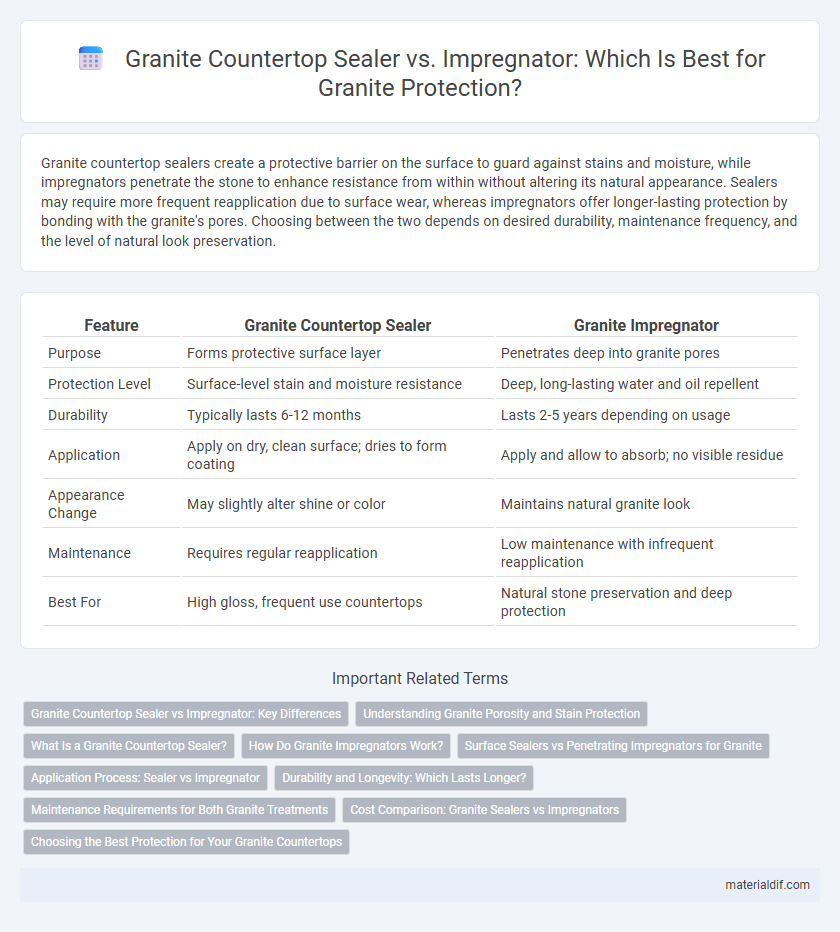Granite countertop sealers create a protective barrier on the surface to guard against stains and moisture, while impregnators penetrate the stone to enhance resistance from within without altering its natural appearance. Sealers may require more frequent reapplication due to surface wear, whereas impregnators offer longer-lasting protection by bonding with the granite's pores. Choosing between the two depends on desired durability, maintenance frequency, and the level of natural look preservation.
Table of Comparison
| Feature | Granite Countertop Sealer | Granite Impregnator |
|---|---|---|
| Purpose | Forms protective surface layer | Penetrates deep into granite pores |
| Protection Level | Surface-level stain and moisture resistance | Deep, long-lasting water and oil repellent |
| Durability | Typically lasts 6-12 months | Lasts 2-5 years depending on usage |
| Application | Apply on dry, clean surface; dries to form coating | Apply and allow to absorb; no visible residue |
| Appearance Change | May slightly alter shine or color | Maintains natural granite look |
| Maintenance | Requires regular reapplication | Low maintenance with infrequent reapplication |
| Best For | High gloss, frequent use countertops | Natural stone preservation and deep protection |
Granite Countertop Sealer vs Impregnator: Key Differences
Granite countertop sealer creates a protective film on the surface to repel liquids and prevent stains, while impregnators penetrate deep into the stone, enhancing durability and natural appearance without altering the texture. Sealers typically require more frequent reapplication as they sit on top of the granite, whereas impregnators offer longer-lasting protection by bonding with the stone's pores. Choosing between a sealer and an impregnator depends on the granite's porosity and desired maintenance frequency, with impregnators often preferred for their subtle, effective defense.
Understanding Granite Porosity and Stain Protection
Granite porosity determines the effectiveness of sealers and impregnators in stain protection, as sealers form a surface barrier while impregnators penetrate deeper to fill microscopic pores. Impregnators are typically preferred for natural granite due to their ability to enhance resistance against oil and water-based stains without altering the granite's natural appearance. Understanding the specific porosity level of your granite ensures optimal product choice, prolonging durability and maintaining the countertop's polished finish.
What Is a Granite Countertop Sealer?
A granite countertop sealer is a protective coating specifically formulated to penetrate the porous surface of granite, creating a barrier against stains, liquids, and everyday wear. It helps maintain the stone's natural beauty by preventing moisture and oil absorption, which can cause discoloration or damage over time. Choosing the right sealer enhances the durability and longevity of granite countertops, ensuring they remain resistant to scratches and spills.
How Do Granite Impregnators Work?
Granite impregnators penetrate deep into the porous structure of granite surfaces, creating a protective barrier against moisture and stains without altering the stone's natural appearance. Unlike surface sealers that form a coating on top, impregnators bond with the granite internally to repel liquids and oils at the microscopic level. This results in long-lasting protection that maintains the stone's breathability and enhances its durability over time.
Surface Sealers vs Penetrating Impregnators for Granite
Granite countertop sealers divide into surface sealers and penetrating impregnators, each offering distinct protection methods. Surface sealers create a protective layer that resists stains and moisture on the granite's surface but may require frequent reapplication due to wear. Penetrating impregnators absorb into the granite's pores, providing deeper protection against stains and water damage while maintaining the stone's natural appearance and durability for a longer period.
Application Process: Sealer vs Impregnator
Granite countertop sealers create a protective layer on the surface, requiring a straightforward application with a brush or cloth followed by drying, ideal for blocking surface stains. Impregnators penetrate the stone's pores, applying with a low-pressure method to enhance long-term protection without altering the appearance. The sealer's process is quicker but needs frequent reapplication, whereas impregnators offer deeper, longer-lasting defense with a more involved initial application.
Durability and Longevity: Which Lasts Longer?
Granite countertop sealers create a protective barrier on the surface, preventing stains but may require reapplication every 1-3 years due to wear from daily use. Impregnators penetrate deep into the stone's pores, offering more durable protection by enhancing resistance to liquids and oils, often lasting up to 5-10 years without needing frequent maintenance. Choosing an impregnator typically results in longer-lasting protection and better preservation of the granite's natural appearance over time.
Maintenance Requirements for Both Granite Treatments
Granite countertop sealers require regular reapplication, typically every 1 to 3 years, to maintain their protective barrier against stains and moisture. Impregnators penetrate deeper into the stone, offering longer-lasting protection with fewer maintenance intervals, often lasting up to 5 years. Choosing between the two depends on the desired frequency of upkeep and the specific exposure conditions of the granite surface.
Cost Comparison: Granite Sealers vs Impregnators
Granite countertop sealers generally cost between $10 and $30 per quart, making them a more affordable option for homeowners aiming to protect their surfaces. Impregnators, designed to penetrate deeper and provide longer-lasting protection, often range from $30 to $60 per quart, reflecting their enhanced performance and durability. Despite the higher upfront cost, impregnators can reduce the frequency of applications, potentially lowering long-term maintenance expenses compared to standard sealers.
Choosing the Best Protection for Your Granite Countertops
Granite countertop sealers form a protective layer on the surface, preventing stains and moisture penetration, while impregnators penetrate deeply to preserve the stone's natural breathability and durability. Choosing between a granite sealer and impregnator depends on your countertop's usage, with sealers being ideal for low-traffic areas needing quick reapplication, and impregnators suited for high-traffic kitchens requiring long-lasting protection. For optimal granite maintenance, consider a product with high resistance to oil and water absorption, ensuring longevity and preserving the stone's natural appearance.
Granite Countertop Sealer vs Impregnator Infographic

 materialdif.com
materialdif.com